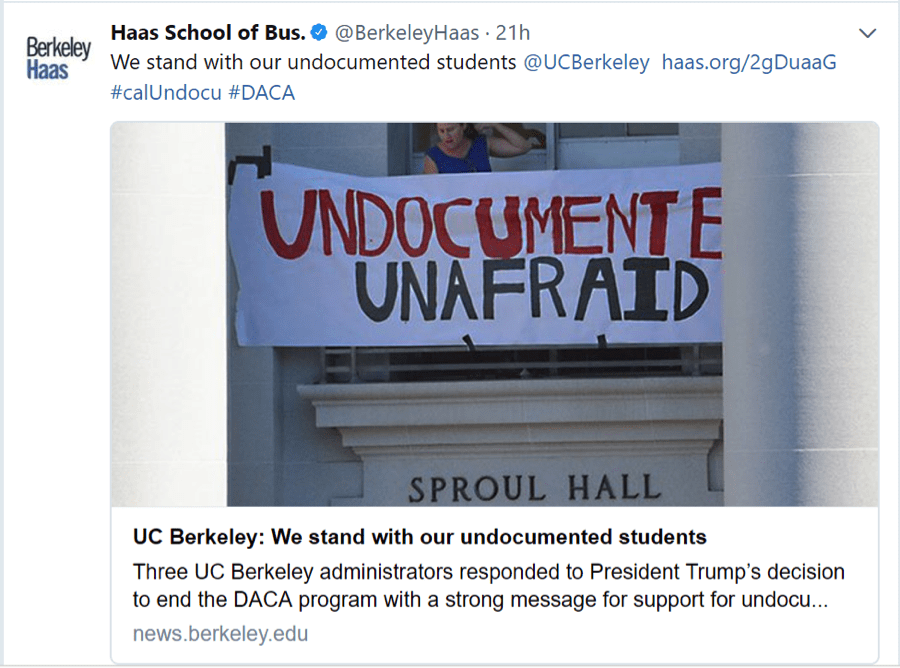Berkeley Haas Debuts Dialogues on Race Seminar Series

Discussing race, identity, and power among colleagues can be a tough hurdle for any group, but the new Berkeley Haas School of Business ten-week, student-led seminar entitled “Dialogues on Race” is leading students to a more welcomed environment to do so.
The Race Inclusion Initiative surveyed MBA students and found that despite the fact that the vast majority “believes that understanding racial dynamics is a key component of effective leadership, less than 50 percent say they are comfortable talking about race.”
“Dialogues on Race” co-facilitator Liz Koenig, MBA ’18, believes, “The ability to reflect on identity and power is a core competency, certainly for being a leader of any kind, or a manager of human beings. My hope is that we get to a place where this is considered core to the fabric of any MBA program.”
Koenig, co-facilitator Om Chitale, MBA ’18, and faculty sponsor Assistant Professor Drew Jacoby-Senghor, “actively recruited a broad cross-section of students,” which ultimately yielded a 60/40 racial and ethnic breakdown similar to that of the US. “We didn’t want to end up in a situation where there was anyone who felt like they had to speak for a group,” adds Koenig.
Students who participated in the seminar were prompted to share reflections about when they first began to understand their racial identity, as well as “past experiences talking about race, and hopes and concerns for the class.” Anne Kramer, MBA ’18, offers, “We were there to understand differences and then have a dialogue about them.”
As someone who identifies as both black and Pacific Islander, Erin Gums, MBA ’18, and VP of Diversity of the MBA Association, explains that she had “thought about and talked about race her entire life—but was not having those conversations with her white peers.”
“Issues of race and racism are so complex and messy—there’s no one approach or one good way to solve it. If it were that simple we would have figured it out by now. There are many roles we need people to play to address systemic issues,” Gums said.
She adds, “I have chosen to be in the business world and be a business leader, and I have chosen to play a role in pushing for a less racist society. My fluency with these topics is going to be greater than that of people who have just started thinking about these issues for the first time in their lives, and that’s okay.”
Adrian Williams, MBA ’18, remarked on the evolution of the seminar’s goals over the ten-week span. “At first it was giving people practical, tactical tools on how to attack issues of diversity and inclusion outside of the classroom. Over time, we realized some of the issues were a lot more nuanced than we thought. It also became apparent that I had some blind spots that required me to think through some of my arguments.”
Of the seminar’s overarching goals, Chitale concludes, “Businesses have power and influence in society. If we can get business leaders to be open and vulnerable on ideas of identity and power and privilege, I truly believe that’s going to have an impact on society.”
The San Francisco One-Year MBA Programs You Need to Know

One-year MBA applicants already know which industry or area of concentration they want to pursue. They are MBA candidates who want to advance their current careers, rather than change them. Others chose the one-year route because it can be difficult to leave two years of work and salary. If you’re a prospective MBA in the San Francisco metro looking to make moves within your industry, we’ll show you what One-Year MBA options are out there for you.
Who Pursues One-Year MBA Programs?
According to U.S. News & World Report, accelerated MBA programs appeal to those who want to continue working in the same industry but want to move into a higher position; those who want to save time and money; and those who may want a faster return on investment for their MBA.
One-year MBAs condense what would be a semester’s worth of core business courses in a full-time program into only a few weeks. Most incoming students enter with a strong base of business knowledge. One-year programs typically do not feature a summer internship, which means that accelerated MBAs may not offer the same career opportunities that a full-time program does.
Popular One-Year MBA Programs
One-year programs have been popular in Europe for years, but have grown in popularity stateside over the past decade. Not all business schools offer a One-Year MBA, but a handful of top schools do, including:
- The Columbia Business School – Accelerated MBA Program
- The Kellogg School of Management – One-Year MBA Program
- The Johnson School (Cornell University) – Accelerated MBA
- The Goizueta Business School (Emory University) – Full-Time MBA, One-Year Experience
One-Year MBA Offerings in San Francisco
San Francisco is the cultural, commercial, financial, and educational epicenter of Northern California and Silicon Valley. Naturally, it is also home to some of the country’s premier business schools, like UC Berkeley’s Haas School of Business and Stanford University Graduate School of Business. However, those schools do not offer One-Year MBA programs.
Schools in the Bay Area that offer Accelerated MBA programs are:
- San Francisco State University College of Business
- Lucas Graduate School of Business – San Jose State University
Let’s take a closer look at these school’s One-Year MBA offerings.
San Francisco State University College of Business
San Francisco State’s full-time MBA degree is known as the Fast-Track MBA. The program features both afternoon and evening classes and can be completed in 12 months.
In order to graduate, students must fulfill a Professional Development Workshop series, eight foundation courses and ten advanced requirement courses. In the first semester of the program, students complete 15 units of core coursework, along with four workshops. After completing these requirements, students select 15 units of electives from nine possible areas of specialization, such as Accounting, Operations Research, Electronic Commerce, Finance, Information Systems, International Business, Management, Marketing, and Sustainable Business.
The program ends with a case study in Strategic Management, which evaluates strategy formulation, implementation, techniques and decision-making in the context of the economic, social, political and competitive global environment.
Tuition costs for the San Francisco State Fast-Track MBA program amount to $3,540 plus $270 per unit for part-time California residents and $5,546 plus $270 per unit for full time residents. For out of state and international students, part-time tuition is $3,540 plus $666 per unit while full-time tuition is $5,546 plus $666 per unit.
Lucas Graduate School of Business
Lucas Graduate School of Business at San Jose State offers an Early Career MBA Accelerated Track, designed for individuals who are willing to follow a very intense academic pace and wish to complete their MBA degree in 12 months. The fast-paced program is made up of 2-3 courses per session with 6-8 weeks of courses per class. The program is offered once a year starting in fall, and spans 12 months.
The Early Career MBA curriculum consists of 42 semester credit units containing 11 core courses and four electives. The core courses are often prerequisites to electives, such as Business Communications, Managing in the Global Economy, Developing and Managing People, Accounting Principles, Marketing Management, Law and Ethic, Managerial Decision Analysis, and Silicon Valley Experience.
Following core coursework, students must take a minimum of four classes (12 units) of elective coursework in the disciplines of: Accounting, Finance, Marketing, Organizational Development, Global Business Development, Entrepreneurship and Venture Development, Information Systems, and Operations Management. Students may also participate in an international semester in the summer term.
Tuition costs for the Accelerated MBA program is $25,072 for in-state residents and $41,704 for out-of-state residents.
Full-Time MBA Battle: San Francisco vs. Seattle

Whether it’s 49ers vs the Seahawks or Apple vs Microsoft, it may seem like there are a lot of differences between San Francisco and Seattle. Putting these minor dissimilarities aside, however, and you’ll find common ground between two of the northwest’s biggest cities: Both metros are known as top locations for prospective MBAs looking to earn an advanced business degree full-time. Continue reading…
Business, University Leaders Speak Out Against DACA Repeal

When the Trump administration formally announced yesterday that it would end the Deferred Action for Childhood Arrivals program (DACA)—putting a six-month expiration date on legal protections granted to approximately 800,000 people who entered the U.S. illegally as children—universities and business leaders were quick to condemn it. Indeed, vocal defense of the “Dreamers,” as those in the DACA program are called, resounded from Silicon Valley to the Ivy League.
“Dreamers contribute to our companies and our communities just as much as you and I,” tweeted Tim Cook, CEO of Apple and an MBA graduate of Emory’s Goizueta Business School. “Apple will fight for them to be treated as equals.” In an earlier statement Cook noted that Apple employs hundreds of people covered by DACA.
Facebook CEO Mark Zuckerberg released his own statement on his personal Facebook page. “This is a sad day for our country,” he wrote. “The decision to end DACA is not just wrong. It is particularly cruel to offer young people the American Dream, encourage them to come out of the shadows and trust our government, and then punish them for it.” He added that the young people covered by DACA contribute to their communities and to the economy. “I’ve gotten to know some Dreamers over the past few years, and I’ve always been impressed by their strength and sense of purpose. They don’t deserve to live in fear.”
DACA was enacted in 2012 under former President Barack Obama by executive order, allowing individuals who were brought to the United States as children or teens before mid-2007 to apply for protection from deportation and work permits. To apply, they had to be younger than 31 at the time the program was created, have come to the U.S. before turning 16, and have lived in the U.S. for at least five years. The U.S. Citizenship and Immigration Services reports that roughly 788,000 have had their requests for DACA status accepted.
University and Business School Leaders Denounce DACA Repeal
A Center for American Progress survey of roughly 3,000 DACA recipients found that approximately 72 percent of respondents were in higher education, 13 percent of those pursuing master’s degrees. And leaders in higher education—including at several leading business schools—were every bit as vocal as major business leaders in calling out the Trump administration’s decision and pledging their support to Dreamers.
Geoffrey Garrett, dean of the University of Pennsylvania’s Wharton School, called the repeal of DACA “bad for the economy and bad for society” in a tweet that also expressed his support for an official statement issued earlier in the day by University of Pennsylvania President Amy Gutman.

Maryellen Reilly, Wharton Deputy Vice Dean for Admissions, financial aid and career management, quoted from Gutman’s statement in her own tweet: “At Penn, we are committed to providing a safe and welcoming environment for all of our students and we will do everything we can…”

Columbia University, home to Columbia Business School (CBS), issued its own statement in opposition to the repeal of DACA. “Columbia unequivocally opposes the ending of DACA and is working with others in higher education to urge Congress and federal officials to reinstate DACA’s protections and protect the rights of those with DACA status during and after the ‘wind-down’ process that has been announced,” it read. It went on to add that in keeping with Provost John Henry Coatsworth’s November pledge, “our policies and plans aim to ensure that students who had DACA coverage are able to proceed unimpeded with their studies and that all students in the community feel safe and understand beyond question that Columbia’s dedication to inclusion and diversity, including of undocumented students, is and will remain unwavering.” CBS quickly retweeted its parent university’s stance and linked to the full statement.
And the Haas School of Business at the University of California at Berkeley tweeted: “We stand with our undocumented students.” That tweet linked to a statement issued by three ranking university administrators—Chancellor Carol Christ, Vice Chancellor for Equity & Inclusion Oscar, and Undocumented Student Program Director Meng So—that called on the Berkeley community to stand with undocumented scholars at the university and beyond.

“At a time when our campus and community values are being challenged by the prevailing national rhetoric and policy making, we must deepen our resolve and commitment to our principles and to each other,” read the Berkeley administrators’ statement. “During these difficult moments, we must defend strongly held values of dignity, diversity and community.”
The Kelley School of Business at Indiana University at Bloomington, for its part, retweeted its parent university’s official statement and pledge to support all its students.

In the statement, IU President Michael A. McRobbie called out the decision to end DACA “especially in light of the administration’s prior statements expressing support for young people protected by DACA and the strong bipartisan support that exists nationwide for maintaining the program.”
McRobbie went on to underscore the university’s support of all its students. “We believe that all of our students, regardless of their background or country of origin, bring to our campuses unique perspectives and experiences that enrich our living and learning communities,” he wrote. “In doing so, they reflect who we are—and what we strive to be—as a university that provides all students with the opportunity to expand their knowledge and succeed in a place where they feel valued, respected and at home.”
In fact, IU features an entire website—DACA @ IU—dedicated to helping DACA students at the university. On the website, the university states that though bound by state and federal laws, it will take steps to support all IU students regardless of documentation and will only inquire into a person’s immigration status when required by law. IU also provides counseling and support to students who have immigration-related concerns, including connecting students with available resources for educational and living expenses.
Penn, Columbia, Berkeley, and IU are just a few of countless schools that spoke out against the Trump administration’s decision. Prior to the final decision to end DACA, 600 college and university presidents signed a statement promoting DACA back in November. Even more recently, Duke University’s President Vincent E. Price wrote a letter in support of the program, and University of Michigan President Mark Schlissel made a statement as part of the university’s September 1st convocation saying, “I would like to reiterate to all of our students, from our own state, elsewhere around the country, and from all around the world, that you are welcome here … You make us a stronger university and enrich our community and nation by your many talents, hard work, and the diverse perspectives and life experiences you bring to campus.”
As information continues to be provided by the Trump administration, many universities and schools are preparing to provide up-to-date information for their DACA students and all who are affected. Check in with your school for more information.
This article has been edited and republished with permissions from Clear Admit.
Gabelli Faculty Return To School With New Consortium Knowledge

At the Fordham University Gabelli School of Business in New York City, the professors never stop learning. When summer rolls around, instead of taking a break, some go on to further their education—bringing it back to their students come fall.
Three Gabelli professors attended the Aspen Undergraduate Business Education Consortium at the Haas School of Business at UC Berkeley. Business school professors Miguel Alzola, Julita Haber, and Kelly Ulto went to the two-day consortium to learn how to integrate business and the liberal arts. Faculty from about 40 other colleges and universities joined the event.
The consortium sought to show how business education can help students “make sense of the world and their place in it while preparing them to engage responsibly with the life of their times,” according to a press release.
Guest speakers included Harvard Professor Mihir Desai and Haas School Dean Richard Lyons. Lyons spoke about the role of educators for future generations. Vice President of Apple Joel Podolny presented at the consortium too. He explained how a company “can stay true to its vision,” per the press release.
The three faculty members plan to bring this knowledge back to their students this coming school year. Gabelli MBA candidates and undergraduate students alike will learn the value of mixing business with the liberal arts.
Haas Sharing Economy Study Explores How Manufacturers Can Adapt

New working research from the Haas School of Business at UC Berkeley suggests that the sharing economy might actually be more beneficial to manufacturers than previously thought.
